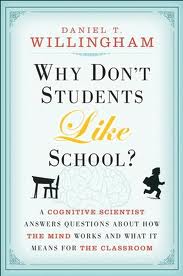Cognitive Conditions for Learning
Why Don’t Students Like School?
by Daniel L. Willingham
(Jossey Bass, 2010 – Learn more)
Reviewed by Bill Ivey
I’ll happily admit to being a lucky teacher. I think more of my students than not honestly do like school, and I’ve had any number of conversations with kids who look forward more to the ends than to the beginnings of vacations. That said, I want all my students to like school as much as possible, learn as much as possible, and (perhaps most importantly) think as deeply as possible.
I’ve also learned to respect Dan Willingham’s work by following him on Twitter. So it’s no surprise that, for all intents and purposes, I read Willingham’s 2009 book Why Don’t Students Like School? (subtitled A Cognitive Scientist Answers Questions About How the Mind Works and What It Means for the Classroom) straight through in one go.
The struggle to think
 In the Introduction, Willingham notes that we’ve learned more about how people learn in the past 25 years than in the previous 2500. Yet, rather than transforming education, this revolution has led to an ever-increasing gap between research and practice. Part of the problem, he acknowledges, is that a classroom is not like a laboratory. That said, another far more surprising aspect of the problem is that, when you step back and take an objective look, people aren’t actually all that good at thinking. In fact, the brain is designed to avoid thinking. I’ll confess, I took a secret delight that his assertion made me, well, think. But I was also decidedly primed to keep reading.
In the Introduction, Willingham notes that we’ve learned more about how people learn in the past 25 years than in the previous 2500. Yet, rather than transforming education, this revolution has led to an ever-increasing gap between research and practice. Part of the problem, he acknowledges, is that a classroom is not like a laboratory. That said, another far more surprising aspect of the problem is that, when you step back and take an objective look, people aren’t actually all that good at thinking. In fact, the brain is designed to avoid thinking. I’ll confess, I took a secret delight that his assertion made me, well, think. But I was also decidedly primed to keep reading.
Having established this somewhat disconcerting given, Willingham goes on to organize his book around nine common questions teachers have, connecting them to principles of cognitive science, and exploring implications for our practice. The first chapter, for instance, is organized around the titular question “Why don’t students like school?” and proceeds to quickly establish the cognitive principle that “People are naturally curious, but we are not naturally good thinkers; unless the cognitive conditions are right, we will avoid thinking.” (p.3)
Those cognitive conditions might be enhanced by love of a specific topic, but it’s more important that the difficulty level of the mental work is about right for a specific person and that the mental work is pleasurable in that it leads to success. Implications for the classroom? “Be sure that there are problems to be solved… Respect students’ cognitive limits… [Clarify] the problems to be solved… Accept and act on variation in student preparation… Change the pace… Keep a diary.” (pp.19-22)
So far, so good. All this makes intuitive sense (shoot, there I am avoiding thinking again!) and complements many of the principles and practices I bring to my own classroom — no surprise, since research also informed and shaped the views of people who have informed and shaped my own views, from the authors of This We Believe to Rick Wormeli (e.g. Fair Isn’t Always Equal) and Mark Springer (e.g. Soundings).
A nervous current
For all I loved the first chapter of Why Don’t Students Like School, both for what it taught me about learning and for how that relates to good practice, I felt a growing sense of nervousness. Skills, I had heard from Robert Pondiscio, a great admirer of Willingham’s, cannot be taught in isolation from content. While I agreed in principle, the skeletal structure of my own course, as befits a democratic classroom, was built on the notion that the skills students need to learn are relatively consistent from year to year, but the content in which a given group of kids is interested can change a great deal – not only from year to year but also within a given year for a given group.
Hence, my nervousness. Would Willingham’s work support my belief that my Humanities 7 students should be able to determine what they learn? And if not, would I be able to continue down the road less taken or would Willingham convince me it would be in my students’ best interest to abandon my most deeply held principles? It wouldn’t be long before I would find out – the second chapter was entitled, “How can I teach students the skills they need?”
The cognitive principle behind this chapter is, “Factual knowledge must precede skill.” (p.25) Willingham offered as one example the title of an article from the technical journal Science, “Physical Model for the Decay and Prevention of Marine Organic Carbon.” Like Willingham, I understood all the words but not “why [organic carbon’s] decay or preservation is important, nor why you might want to model it.” (p.27) So, okay, background knowledge is necessary to understanding and must thus be explicitly learned.
Additionally, it makes sense that the more you know, the more you can learn, since “background knowledge allows chunking, which makes more room in working memory, which makes it easier to relate ideas, and therefore to comprehend.” (p.35) Increasing the background knowledge available in your long-term memory can also enhance your cognitive skills and even improve your memory itself. (pp.37-47) Agreed and agreed. The question then becomes “How to evaluate which knowledge to instill.” (p.47) This section looked to be the defining moment of my own personal experience with the book.
On the Dead (White Male) Sea
Willingham took the intriguing approach of re-defining the implicit question of the section header into the question, “What knowledge yields the greatest cognitive benefit?” The answer is complicated, and relates both to what our culture assumes people know (what background knowledge do we have in common?) and to specifically what knowledge is required for a specific discipline.
Having taught in a girls school for nearly 30 years, fighting for social justice has become ingrained in me, not just from the perspective of gender but also from the perspectives of race, sexuality, and more. Willingham seems to share my “[distress] that much of what writers assume their readers know seems to be touchstones of the culture of dead white males” (p.47) while conceding a “change [in culture] would be difficult to bring about.” (p.48)
Some level of awareness of common ideas of our culture, however arbitrary that determination may be, becomes a necessity. He advocates teaching “a limited number of ideas in great depth” — again, a principle with which I felt an emotional as well as an intellectual connection.
To my huge relief, I realized that all of this can, in fact, happen in a middle school democratic classroom. Indeed, it may perhaps be most easily accomplished at that level. Pondiscio and I would later have a stimulating and enjoyable Twitter conversation where I learned that he, too, would agree.
Clear sailing, with some tacking ahead
I sailed happily through the rest of the book, knowing some ideas would stick immediately and I would have to return to others and work my way through them. Like any good book on research and practice, you get more out of it the more often you read it – and the more you reflect. So it makes sense that Willingham’s ninth and final chapter looks at teachers’ minds, noting that “Teaching, like any complex cognitive skill, must be practiced to be improved.” (p.189)
With that in mind, I will end with the same words with which Willingham ends his book: “Education makes better minds, and knowledge of the mind can make better education.”
Bill Ivey is Middle School Dean at all-girl Stoneleigh-Burnham School in Greenfield MA, where he also teaches Humanities 7, French, and the Middle and Upper School Rock Bands. Bill is the advisor for MOCA, the middle school student government, and he coordinates and participates in the middle school service program. Bill’s other MiddleWeb posts include Hungering for a Better World and Actually, You ARE Special.



































1 Response
[…] (click here to continue reading) Share this:FacebookTwitterEmailPrintLike this:LikeBe the first to like this. […]